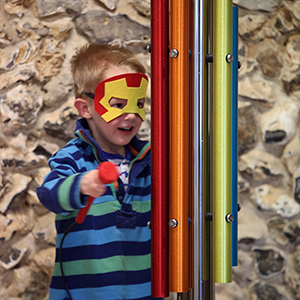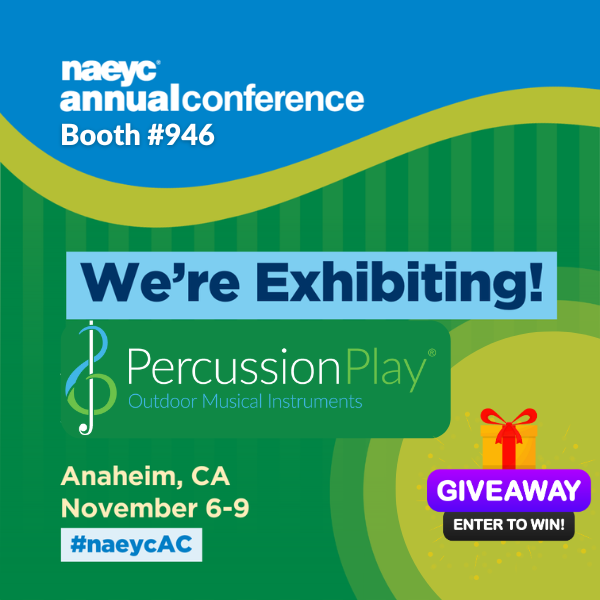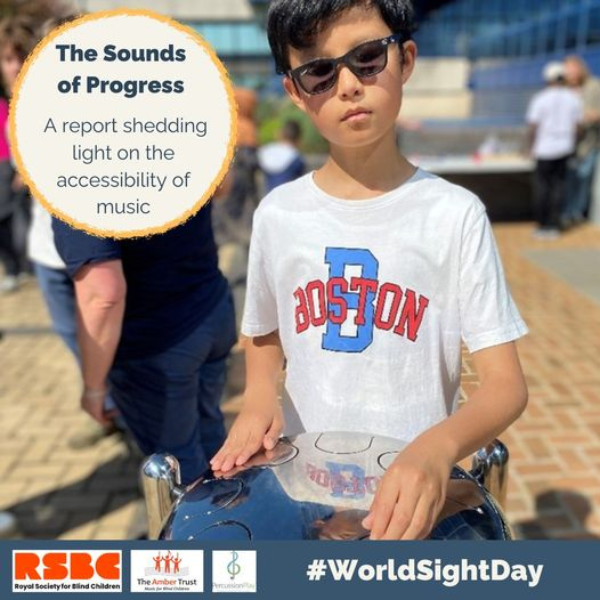World Book Day (UK) 2022
In the UK and Ireland, 3 March 2022 is World Book Day, and this year we are celebrating 25 years of changing lives through a love of books and shared reading.
World Book Day is a charity on a mission to help change children’s lives by making reading together and reading for pleasure a habit for life. It's a day of celebration of children’s books and reading and is marked in over 100 countries around the globe – although in most countries World Book Day takes place at a different time of year (usually around April 23 - Shakespeare's Birthday)
How wonderful to see that World Book Day 2022 is back to normal with children across the country dressing up as their favorite characters to celebrate books and reading. There are lots of fun activities planned as well as resources to be found and prizes to be won by visiting the World Book Day website.
World Book Day is the perfect opportunity to use outdoor musical instruments to help celebrate - integrating children’s literature into music time or music lessons by adding songs and sound effects to the stories and acting them out during the class to have a little creative fun and awaken the imaginations of our children.
Five Ways to Integrate Music with Reading on World Book Day
1. Inspiring Books To Create a Love of Music
There are so many books, both fiction and non-fiction, focused on music and musicians. Sitting and reading these together is a great way to start exploring the world of music with young children from the comfort of your own home. Reading widely in this way helps children build background knowledge, vocabulary, and comprehension skills. Exploring music through books written for children is a great way to establish a lifelong love of music, whether through books about exploring instruments, learning to read music, or simply appreciating the many different aspects of music.
A quick google-search will soon have you armed with a myriad of suitably aged books about music.
2. Music Activities to Discover Word Patterns
Musical activities are beneficial when building foundational early literacy skills. The ability to detect sound patterns in words is vitally important for literacy and is a skill that can easily be promoted through music in the early years. Indeed, patterns are the vocabulary of music. Children who can play easily with the sounds in words tend to become good at reading and writing.
Moving in time with music may improve temporal (related to time) processing and help coordination through rhythmic entrainment (pulling along to the rhythm). Music is motoric, and it stimulates both sides of the brain. Musical activities also assist memory retention and recall while also improving focus and attention. When an action is undertaken regularly, the brain is stimulated to remember and recognize it.
Fun musical activities also encourage the repetition of motor and language skills without becoming laborious.
3. Music Analysis to Boost Vocabulary
Music is one of the most powerful forms of expression for people. This is why it is essential to educate children in music appreciation. Teaching a child musical literacy, styling, and genres helps them understand different cultures' historical events and develop their own personal tastes.
Use listening skills and then descriptive text to evaluate music and music performances. Learning and practicing vocabulary relating to music, including; the different types of musical instruments used, how performers play them, the sounds they produce, the dynamics used, and how the music makes the listener feel, are all great ways to boost vocabulary while gaining musical appreciation.
4. Develop Compositional Skills
Every child loves a good story with strong characters, a memorable setting, the central conflict, and a plot. Task your young people to create their own story using pictures and writing, and then try adding their own musical score. Children will develop their compositional skills and creatively think about how different instruments/sounds/textures can help to portray a particular character, creature, and/or emotion.
Why not listen to some traditional folk music to inspire them? Folk music is known as the storytelling genre and has helped preserve the world's traditional stories for generations. In fact, sea shanties (a type of collective folk song, typically performed a cappella on ships by fishermen, merchant sailors, or whalers when carrying out the heavy, repetitive tasks such as sail-hoisting and deck-scrubbing) have recently become a TikTok trend with the famous and not so famous performing melodies like ‘The Wellerman’ and ‘(What Shall We Do with the) Drunken Sailor’ and posting them all over social media.
5. Lyrical Treasure Hunt & Inspire the Future Songwriters
How about combining composition and a good run around the yard? Hide envelopes or containers that each contain a phrase – then ask your youngsters to find them, open them and construct a melody to accompany the phrases in the order they were discovered.
When children learn how to write songs, they are forced to learn how language works and experiment with different rhythmical and rhyming structures. Songwriting and composing take an enormous amount of both spontaneity and intense focus. They'll need to get creative and consider the use of lyrics, rhythm, and tone. Nursery rhymes are good melodies to start with, as they are simple and memorable. Another great exercise is to choose one of their favorite songs and rewrite the words to go with the existing melody.
Songwriting is also an excellent way for children to process their feelings in a positive, constructive way.



